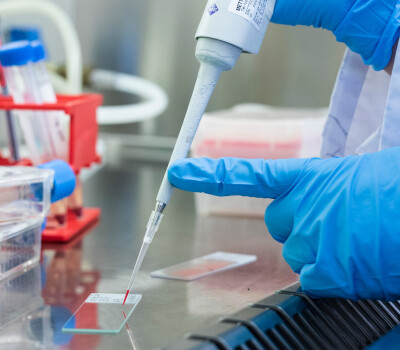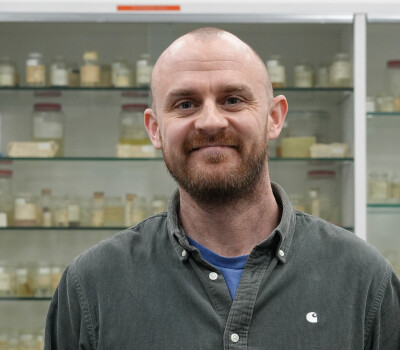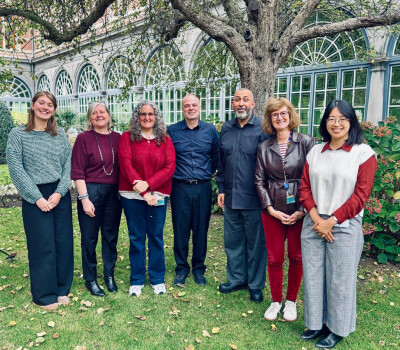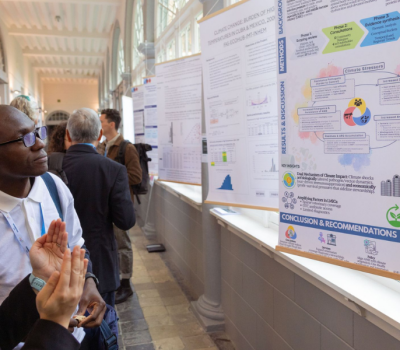ITM and its Guinean partner institution train hundreds of Guinean health workers

Following the devastating impact of the Ebola outbreak of 2014 that weakened Guinea’s health services, there had been increasing demand to train health staff to reinforce the country’s health system. ITM and the Maferinyah National Training and Research Center in Rural Health (CNFRSR) developed and provided online courses on primary health care, management of sexual and reproductive health, and research methods to Guinean health professionals.
So far, 543 people were trained through the three courses. A paper published in Frontiers Digital Health journal on 27 June revealed successful completion rates between 72% and 85%. 87% of the learners reported to have applied the newly acquired knowledge and skills during the courses through activities such as supervision, service delivery, and training workshops. Trainees have also reported a positive impact of the training on utilisation/coverage of services and increased revenues for their health facility. Dr Tamba Mina Millimouno, researcher at CNFRSR and MPH alumnus at ITM and first author of the paper explains: “This blended learning was a successful capacity building experience which was beneficial not only to trainees but also to trainers. Previous papers published in BMC Medical Education and Santé Publique described learners’ satisfaction with the training and the trainers’ capacity building that took place at ITM. Now, the complete expertise is available at Maferinyah: we can do everything from the design of a course to its implementation and impact evaluation.”
Since the Ebola epidemic of 2014-2016, Guinea has been rebuilding and strengthening its health system, which once again experienced major setback with the COVID-19 epidemic. Many young health professionals, such as medical doctors, nurses and midwives struggle to build up experience on the job. As part of the health system recovery and resilience plan, the Guinean government has recruited and posted thousands of new health workers in rural areas. With the new courses, ITM and CNFRSR contributed to preparing these young professionals to the management of health services and research methods. The first two courses on management of Primary Health Care (eSSP) and Sexual and Reproductive Health Services (eSSR) were designed in 2017 and addressed the local health system context. They targeted medical doctors, nurses and midwives, as well as medical students at the end of their studies. The third course on Research Methods (eMR), developed in 2019, targeted medical students and health professionals involved in public health and research. One participant reported: “Since I took the eMR course, I have become much more effective in accompanying students who are developing their thesis in medicine. Also, I have started [working as] a research assistant for a PhD student in epidemiology and statistics, and I feel comfortable working with her because I have been really well prepaired [by the training].”
Challenges however, remain. Dr Thérèse Delvaux, senior researcher and lecturer in ITM’s Sexual and Reproductive Health Research Group explains: “despite all our efforts, the percentage of women in our courses stayed low at 25%, so there is room for improvement.” Dropping out from online courses remains a significant concern as well; in the Guinean context, this is partly attributed to poor internet connection or other technical issues. But the future looks bright. Over the past 10 years, internet coverage considerably increased in the whole country (0.4% in 2010 to 33% in 2018), and both the Ebola and the COVID-19 crises are propelling technological progress. And are the courses sustainable? “Depends on funding and several other factors of course,” says Dr Delvaux, “but the eMR course, if accompanied by a research protocol writing component, has the most potential to be incorporated into university curriculum.”
The project was supported by the Belgian Development Agency (Enabel) and ITM’s fourth framework agreement with the Belgian Directorate-General for Development Cooperation and Humanitarian Aid (DGD).
ITM and its Guinean partners
The Maferinyah National Training and Research Center in Rural Health (CNFRSR) is a training and research institution of the Ministry of Health in Guinea located in Forecariah district, about 75 km from the capital Conakry. The institute has been a partner of ITM since 2017, in the framework of the capacity building programme between ITM and DGD. The African Center of Excellence for Prevention and Control of Tropical Diseases (CEA-PCMT) has become an ITM partner in 2022. Due to its connection to the University Gamal Nasser in Conakry, it has the potential to facilitate the integration of an e-learning course in the academic curriculum. Professor Alexandre Delamou, an ITM alumnus (MPH 2011, PhD 2018) is the deputy director of CNFRSR: “We are very proud of the quality of the past ITM – Maferinyah collaboration under the DGD programme. It has created the conditions for a successful implementation and greater impact of our upcoming projects.”
Spread the word! Share this story on









